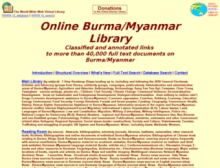Resource information
Abstract:
Millions of people from Burma have migrated into neighboring countries over the past decade.
Most have left their country in search of security and safety as a direct result of internal conflict
and militarization, severe economic hardship and minority persecution. This exodus represents
one of the largest migration flows in Southeast Asia.
Fearing persecution, the vast majority of those migrating from Burma find themselves desperate
to survive, obtaining work in underground and, often, illegal labor markets. The majority of those
fleeing Burma migrate to neighboring Thailand, where an estimated two million people from
Burma work in “3-D jobs” (dangerous, dirty and difficult). Although there is a growing
awareness of their isolation and vulnerability to labor exploitation and violence, there is little
data available documenting their realities. This results in the alienation of domestic workers and
perpetuates the disregard for their labor and basic rights.
This paper presents the findings of research proposed and implemented by members of the Shan
Women’s Action Network and the Karen Women’s Organization regarding girls and women who
have migrated from Burma into domestic work in Thailand. This paper focuses on the roots
causes of migration from Burma to Thailand, the harsh conditions in which foreign domestic
workers are employed and their inability to defend their most basic rights while they are in
Thailand, and lastly on their future aspirations.
Foreign domestic workers interviewed in this study described that the major cause of migration
were related to political and economic situations in Burma. The push-pull theory explains this
migration stream. In Thailand, the migrant domestic workers being expected to work on
demand, without agreed upon responsibilities or a written contract delineating working hours,
days off, accommodations, salaries, sick leave, care or pay. However, they had their dreams and
hopes of securing a better future for their families and themselves. In the recommendations,
roles of both Burma and Thai governments, NGOs and CBOs in helping establish appropriate
interventions to reduce the abuse, exploitation and trafficking of migrant domestic workers are
stated. The importance of recognizing domestic work as labor as well as the need to provide
protection for the domestic workers under national labor laws is emphasised in this study...


